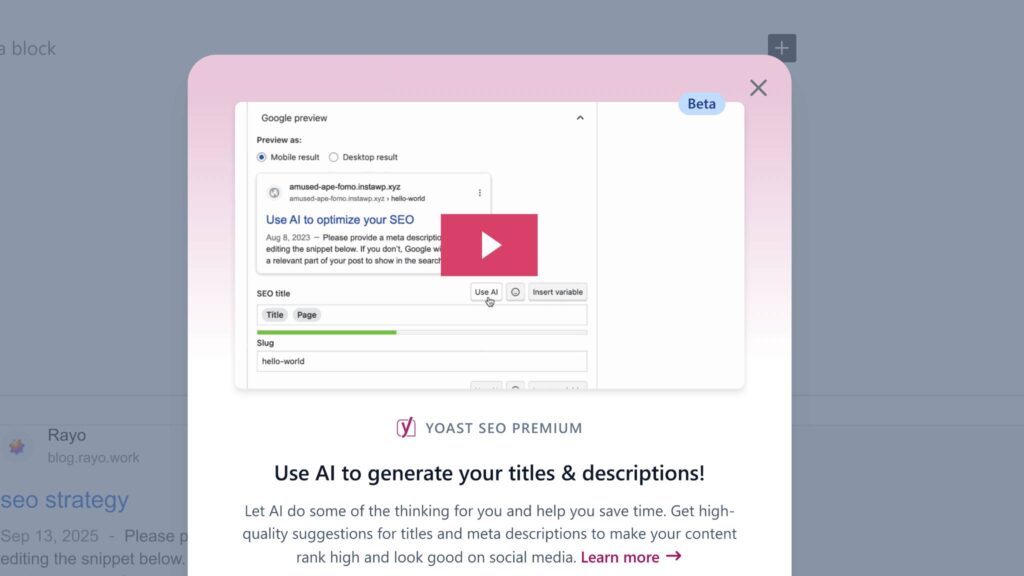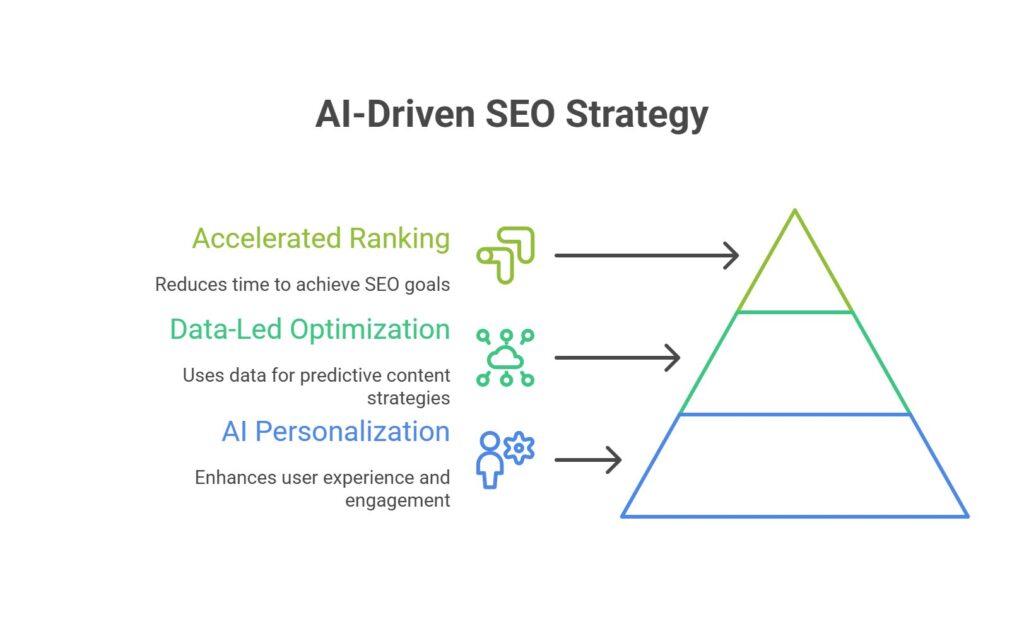Artificial intelligence and search engine optimization are merging to create a future where digital strategies evolve at a rapid pace. This discussion offers insights into new trends, key predictions, and practical benefits that change how content is created, optimized, and discovered online. The content is crafted to help digital marketers and business owners understand the potential impact of AI on SEO.
The changing landscape of digital marketing joins AI-driven tools with time-tested SEO techniques. Readers will gain clarity on current limits, future changes, and the real benefits of blending automatic processes with human insight to achieve superior online performance.
Current state of AI in SEO and its limits
How AI tools are used for metadata, content, and backlinks

Artificial intelligence tools play an important part in improving metadata, improving content quality, and building strong backlink profiles. These systems automate keyword research by examining real-time data and user patterns, enabling marketers to find high-value terms quickly. They generate draft content, suggest topic clusters, and flag issues like keyword density, thus saving time while ensuring that the content meets existing SEO standards. Also, AI platforms assess current backlinks and find new linking opportunities to boost site power. Through natural language processing and machine learning models, AI systems assess context relationships between phrases, helping SEO teams to adjust title tags, meta descriptions, and alt texts in an organized way. This automatic precision not only simplifies routine tasks but also frees experts to focus on creative strategy, ensuring better ranking potential and improved reader engagement.
Why traditional SEO practices still matter
Old SEO practices retain their importance during rapid AI changes. Skilled marketers continue to value detailed keyword research, manual content refinement, and custom link building that build genuine relationships. Basic techniques—such as improving site structure and ensuring mobile reactivity—continue to drive search visibility. Even as AI automates repeated steps, human oversight remains essential to align content with brand tone and audience needs. Manual adjustments add nuance and depth that machine outputs may overlook. This combination of proven methods and innovative AI strategies empowers businesses to achieve higher rankings and earn lasting user trust. Relying solely on automatic processes may result in missed details related to user intent; therefore, merging precise human input with advanced analytics produces a more complete strategy for online success.
5 key ways AI will change SEO in the next 5 years
Artificial intelligence is set to change SEO in changing ways over the next five years. New trends include advanced content creation, customized customization, active predicting analytics, and efficient automatic work. These shifts will empower digital marketers by blending human insight with machine intelligence to drive targeted traffic, win customer trust, and stimulate business growth.
1. AI-generated content will match human quality consistently
Soon, AI-generated content will match the detail and clarity of human-written text. As machine learning models improve, their outputs evolve to match natural tone and contextual accuracy, reducing the gap between automated drafts and manual content crafting. This evolution will deliver engaging material that both search engines and careful readers appreciate while maintaining a consistent level of precision and quality.
2. Search algorithms will become highly personalized
Search algorithms will soon tailor results to individual user contexts with remarkable precision. AI systems analyze diverse user behaviors, preferences, and historical interactions to generate custom search outcomes. This personal approach enhances user satisfaction while driving better engagement by aligning search intent to specific user needs—ensuring the most relevant content is always at hand.
3. Predictive SEO will become the new standard
Predictive SEO is ready to become a core strategy in digital marketing. By using data and trend analysis, AI tools forecast search trends and adjust strategies in real time. This active method enables businesses to expect market shifts and improve content placing, yielding continued online exposure and a competitive advantage that continually drives growth.
4. Conversational search and voice SEO will take priority
Interactive search and voice SEO are set to lead user queries as AI enhances natural language processing abilities. This trend encourages the development of interactive search interfaces that respond naturally to spoken queries within context. As a result, brands will adapt their content for voice optimization, ensuring that answers are delivered accurately and promptly with improved accuracy.
“Voice search isn’t a new trend, but it’s grown in popularity over the last few years. For most people, asking a question is more convenient than typing it out. Voice search is forcing companies to rethink their traditional SEO strategies”.
—Monique De Leon
5. Real-time SEO automation will replace many manual tasks
Real-time SEO automatic work is set to streamline tasks such as keyword analysis, content audits, and technical fixes. Brands will benefit from tools that always monitor site health and execute changes as issues arise. This change allows experts to concentrate on strategic plans, well merging creative input with quick, data-driven actions that strengthen overall rankings.
Future benefits of using AI for SEO strategy

AI will shorten the time needed to achieve ranking goals
AI tools shorten the timeline for reaching top search rankings by automating complex tasks. Through dynamic keyword research and rapid content changes, businesses see gains in exposure sped up by machine learning algorithms that find trends and suggest timely changes. This accelerated process enables companies to surpass rivals and quickly respond to market shifts, allowing marketers to focus on new strategies while cutting down delays and boosting speed in achieving ranking milestones.
Content optimization will be data-led and predictive
AI-driven content optimization relies on real-time insights and careful predicting models to fine‑tune digital strategies. By assessing search trends and user engagement metrics, these systems inform changes that improve performance. They analyze large datasets and reveal patterns that guide keyword selection, topic focus, and structural gains. This method supports businesses in aligning their content with evolving market demands, ensuring relevance and robust placing. Predicting analytics also prompt active updates by finding gaps, reducing the need for constant manual revisions while maintaining ongoing content excellence across platforms.
AI personalization will improve UX, reducing bounce rate
AI customizing tailors website content to match individual visitor preferences, eventually enhancing the overall user experience (UX). By examining visitor behavior and historical data, AI systems modify page layouts, calls-to-action, and navigation to suit each user’s unique needs. This customization not only keeps users engaged for longer periods but also reduces bounce rates and promotes deeper interaction with the site. As these platforms always refine their algorithms, businesses will enjoy higher conversion rates and improved customer satisfaction, driving better organic traffic and encouraging lasting growth with lasting impact.
Conclusion
Looking ahead, the combination of AI and SEO promises to change digital strategies around the globe. Enhanced automatic work, improved customization, and real‑time insights are set to drive content creation and ranking optimizations. Businesses that blend AI tools with old SEO know‑how will secure an edge by meeting evolving user demands with flexibility. Integrating predicting analytics and tailored user experiences indicates a future where search success becomes increasingly achievable through data‑driven decisions. This dynamic landscape calls for a balance between machine speed and human creativity, ensuring that online exposure grows lasting and smartly while adapting to different markets. Stakeholders must invest in both technology and talent, adopting these new ideas to maintain lasting control in an increasingly competitive digital arena.
FAQs
How will AI impact SEO practices by 2030?
What are the benefits of using AI for SEO beyond keyword optimization?
How is AI changing SEO for small business websites?
Should I invest in AI SEO tools for future readiness?
Will human SEO experts become obsolete with AI-based SEO?

Ridam Khare is an SEO strategist with 7+ years of experience specializing in AI-driven content creation. He helps businesses scale high-quality blogs that rank, engage, and convert.



